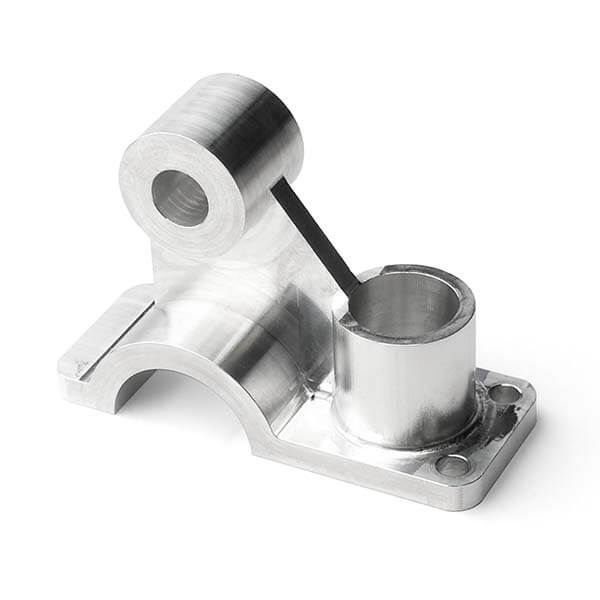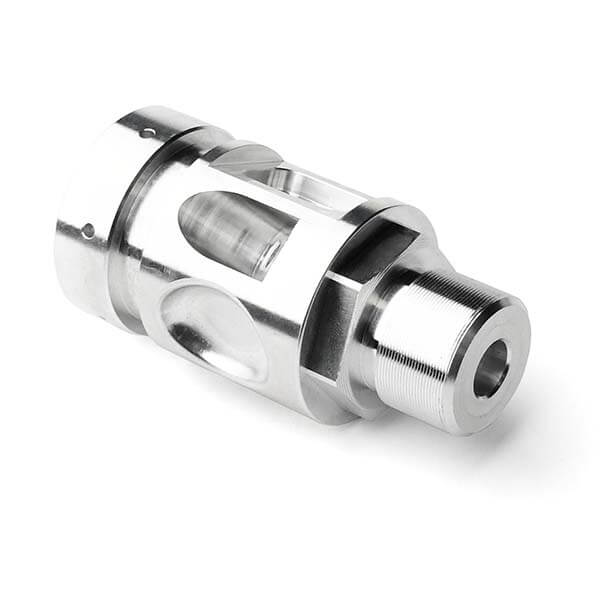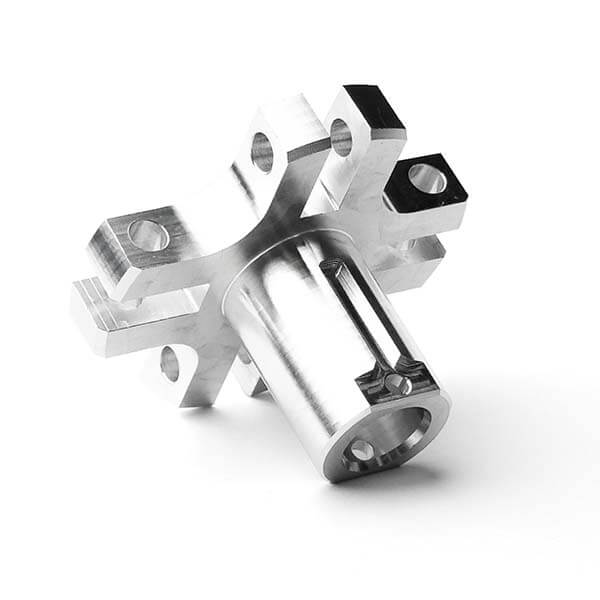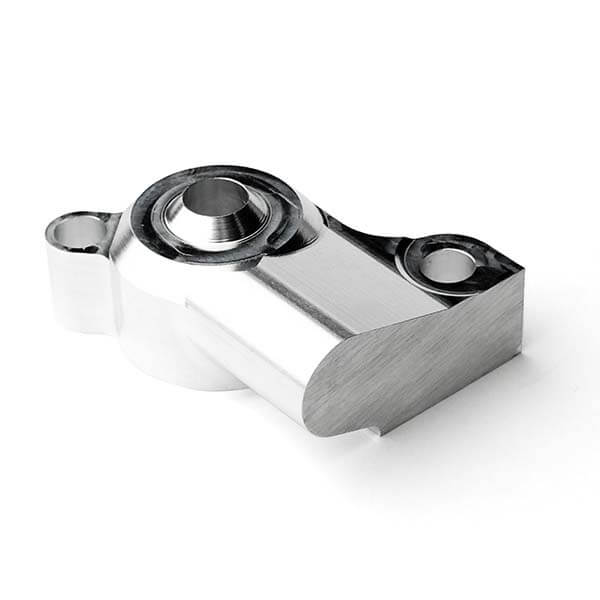Aluminium 7022
Dimensional stability at temperature and corrosion resistance are two key characteristics of Alumold, and these properties make it particularly suitable for the manufacture of moulds for blow-moulding, thermoforming and injection moulding technologies.

PROS
- Good dimensional stability under temperature
- Good heat dissipation properties
- Good corrosion resistance
CONS
- Lower mechanical properties than 7075
- Thin walls difficult to achieve
MAIN FEATURES
- Machining process: CNC machining
- Tolerance: ISO 2768-1 fine (f) or medium (m) class. Info
- Max size: 496 x 496 x 399 mm ; 19.5 x 19.5 x 15.7 in
- Lead time: <4 days
ALUMINIUM 7022 CNC machined VIDEO GALLERY
Dimensional stability
The hot dimensional stability properties of aluminium alloy 7022 are given by the presence of copper as a bonding agent, which contributes to improving the thermal stability property due to its low coefficient of expansion.
Heat Dissipation
Alloy 7022 exhibits good heat dissipation properties, which is particularly advantageous in thermally demanding applications. This fundamental characteristic is always provided by the presence of copper within the alloy, which improves the already good heat dissipation properties.
Corrosion Resistance
Due to the presence of magnesium, aluminium alloy 7022 has good corrosion resistance characteristics, a very important parameter for applications at temperatures that facilitate the occurrence of corrosive and oxidative phenomena.
ALUMOLD IMAGE GALLERY
QUOTE NOW YOUR ALUMINIUM 7022 PARTS
free instant quoteCOMMENT
Aluminium 7022, with its complex combination of elements including aluminium, magnesium, zinc and copper, plays an important role in industry, offering a varied range of applications and unique advantages. This metal alloy stands out for its versatility, finding significant use in the production of moulds for cutting-edge technologies such as blow moulding, thermoforming and injection moulding.
Pros
Good dimensional stability at temperature: The strategic presence of copper as an alloying agent in aluminium alloy 7022 is a key factor in increasing its thermal stability. Copper's low coefficient of expansion emerges as a significant feature, guaranteeing remarkable dimensional stability over a wide temperature range. This distinctive property makes Alloy 7022 a first-rate option for applications requiring impeccable resistance to thermal variations, providing a reliable base on which to build solid performance in dynamic environments.
Good heat dissipation properties: Alloy 7022 has outstanding heat dissipation properties, positioning it as a crucial element in industrial applications requiring superior thermal performance. The presence of copper within the alloy not only contributes to the achievement of good heat dissipation properties, but further amplifies their effectiveness. This aspect makes aluminium 7022 an attractive option in situations where thermal management is an essential requirement, ensuring efficient thermal control and increased reliability in the execution of the applications involved.
Good corrosion resistance: The corrosion resistance of aluminium alloy 7022, fuelled by the strategic presence of magnesium, plays a crucial role in challenging application environments. This parameter becomes vital in environments where temperature can trigger corrosive and oxidative phenomena. The alloy not only resists such destructive agents but emerges as a reliable defence, contributing to its longevity and reliability in demanding environments. The combination of magnesium and other alloy components results in a robust defence against corrosive agents, positioning aluminium 7022 as a reliable choice for applications that require long-term durability.
Cons
Lower mechanical properties than 7075: Despite the distinctive qualities of aluminium alloy 7022, it is important to underline that its mechanical properties are lower than the stronger alloy 7075. This gap in mechanical strength may limit the suitability of aluminium 7022 in applications requiring exceptional structural strength. The decision to choose one of the two alloys will therefore be a careful assessment of the specific needs of the application, taking into account the balance between the required performance and the unique properties of each alloy.
Thin walls that are difficult to produce: A crucial aspect to consider when evaluating aluminium 7022 is the challenge associated with producing thin walls with this alloy. The machining of thin sections presents itself as a potentially complex operation, requiring a high degree of precision and attention during all stages of production. The added complexity in this context could involve greater specialisation and closer control of the machining processes, which in turn could affect the cost and timing of production. This practical consideration is crucial in making an informed choice about the suitability of aluminium 7022 in applications involving the creation of thin walls, allowing for a considered evaluation between its positive characteristics and possible operational challenges.
Applications
Aluminium 7022 stands out as the material of choice for the production of moulds for advanced technologies such as blow moulding, thermoforming and injection moulding. Its presence is particularly predominant in such industrial contexts, offering a number of distinctive advantages that make it essential in various stages of production.
Moulds for Blow Moulding Technology: In the blow moulding sector, aluminium 7022 excels in the creation of moulds that enable the formation of containers, bottles and other three-dimensional objects by expanding molten thermoplastic material. Its exceptional dimensional stability is vital in this process, ensuring the accuracy and consistency in the shape of the objects produced. The heat dissipation capacity of aluminium 7022 is also crucial in situations where temperature is a determining factor in the forming process.
Moulds for Thermoforming: In the field of thermoforming, aluminium 7022 stands out for the creation of moulds used to produce products with curved or complex surfaces. Its high corrosion resistance is a key attribute that makes it suitable for operating in demanding thermal conditions. In addition, the thermal stability of this alloy helps ensure that moulds maintain their desired shape and size during the thermoforming process, resulting in high-quality end products.
Moulds for Injection Technology: In the injection technology sector, aluminium 7022 proves to be essential for the creation of moulds that allow the injection of molten material into a mould to obtain complex plastic parts. Its dimensional stability under temperature, combined with its heat dissipation properties, provides a controlled environment for the injection process. Corrosion resistance, resulting from the presence of magnesium in the alloy, is an added value element that contributes to the durability of moulds over time.
In summary, aluminium 7022 emerges as a key material in the production of moulds for advanced technologies such as blow moulding, thermoforming and injection moulding. Its unique characteristics make it a reliable partner in a wide range of industrial applications, guaranteeing precise, high-quality results in thermally demanding environments.
Conclusion
In conclusion, aluminium 7022 reveals itself as a crucial player in the industrial landscape, intrinsically characterised by an articulated composition of aluminium, magnesium, zinc and copper. Its versatility is crucial, finding significant application in the production of moulds for advanced technologies such as blow moulding, thermoforming and injection moulding. In this in-depth analysis, we have explored both the positive and negative aspects of this metal alloy, highlighting the reasons why it is unique.
Among the advantages, dimensional stability at temperature emerges as a key element, supported by the presence of copper as an alloying agent. This distinctive feature gives aluminium 7022 a first-rate position for applications requiring resistance to thermal variations, providing a reliable basis for solid performance in dynamic environments. Furthermore, the excellent heat dissipation properties, enhanced by the alloy composition, make it an optimal choice in contexts where thermal management is critical, ensuring efficient thermal control and increased reliability.
However, we cannot ignore the challenges presented, such as the lower mechanical properties compared to alloy 7075 and the difficulties in realising thin walls. These considerations must be considered carefully, especially in applications requiring exceptional mechanical strength and in the production of components with more delicate geometries.
Finally, the various applications of aluminium 7022, including blow moulding, thermoforming and injection moulding, underline its cross-industry relevance. Its presence in these advanced technologies demonstrates its versatility and its positive impact on the precision and quality of end products.
Ultimately, the choice to use aluminium 7022 will be guided by a considered assessment of the specific requirements of the application, balancing its unique advantages with potential limitations. Its ubiquity in advanced industrial applications attests to its prominent position in the metal industry, confirming its importance in the production of critical and technologically advanced components.
"Recently, I chose Aluminium 7022 from Weerg. I was extremely satisfied with its thermal stability and the quality of the parts."
ALUMINIUM 7022 PROPERTIES
| Tensile breaking load | 390 MPa |
| Modulus of elasticity | 72 GPa |
| Elongation at break | 5% |
| Density | 2,79 g/cm³ |
| Melting temperature | 640°C |
| Hardness | 120 Brinell |
| Yield Strength | 330 MPa |
"The quality of the parts, competitive price and impeccable customer service won me over. I would highly recommend Weerg's Aluminium 7022 to anyone looking for high quality parts and excellent service."
Questions and answers
7022 aluminum is a 7000 series alloy renowned for its exceptional mechanical strength and rigidity, thanks to its composition, which includes significant amounts of zinc, magnesium, and copper. This alloy is designed for technical applications requiring high structural performance, combining robustness with lightness. One of the key features of 7022 aluminum is its excellent machinability using CNC machines, enabling the production of complex and high-precision components. It also offers good dimensional stability, making it suitable for applications requiring tight tolerances. Although its corrosion resistance is lower compared to other alloys, it can be enhanced with protective treatments, such as anodising, to increase durability in more aggressive environments.
7022 aluminum is widely used in industries that require high-performance materials. In the aerospace sector, it is chosen for the production of lightweight yet extremely strong structural components, such as wing parts, landing gear, and mechanical supports. In the automotive field, it is used for manufacturing frames, suspensions, and other elements subjected to high mechanical stress. Thanks to its dimensional stability and strength, it is also ideal for the production of molds, particularly those for processing plastic materials, where precision and reliability during intensive production cycles are crucial. Additionally, it is employed in the industrial sector for tools and technical equipment, as well as in civil engineering for structural elements exposed to heavy loads.
Compared to other 7000 series alloys, 7022 aluminum stands out for its combination of high mechanical strength and rigidity, making it an excellent choice for structural and precision applications. It is more machinable than alloys like 7075, facilitating the production of complex components using CNC machines and reducing production times. Furthermore, it offers better dimensional stability during machining and thermal variations, making it particularly suitable for the production of high-precision molds and tools. However, compared to 7075, 7022 aluminum may require additional protective treatments to improve corrosion resistance in particularly aggressive environments. This characteristic highlights its greater versatility for applications requiring both high mechanical performance and superior machinability.
7022 aluminum boasts excellent mechanical properties, making it ideal for advanced technical applications. It has a typical tensile strength of approximately 490 MPa and a yield strength of 410 MPa, ensuring high structural performance even under heavy loads. Its Brinell hardness is about 140 HB, providing remarkable resistance to wear and fatigue. The alloy is designed to maintain optimal dimensional stability during machining and in operational conditions involving repeated mechanical stresses. These characteristics make it a reliable material for components that need to withstand intensive usage cycles and critical load conditions, such as molds or structural parts in machinery and vehicles.
QUOTE IN 1 SECOND WITHOUT COMMITMENT
DON'T WAIT: UPLOAD YOUR 3D FILE AND GET A QUOTE FOR YOUR PARTS NOW!
Upload your 3D file to get one step closer to manufacturing your parts.
free instant quote



